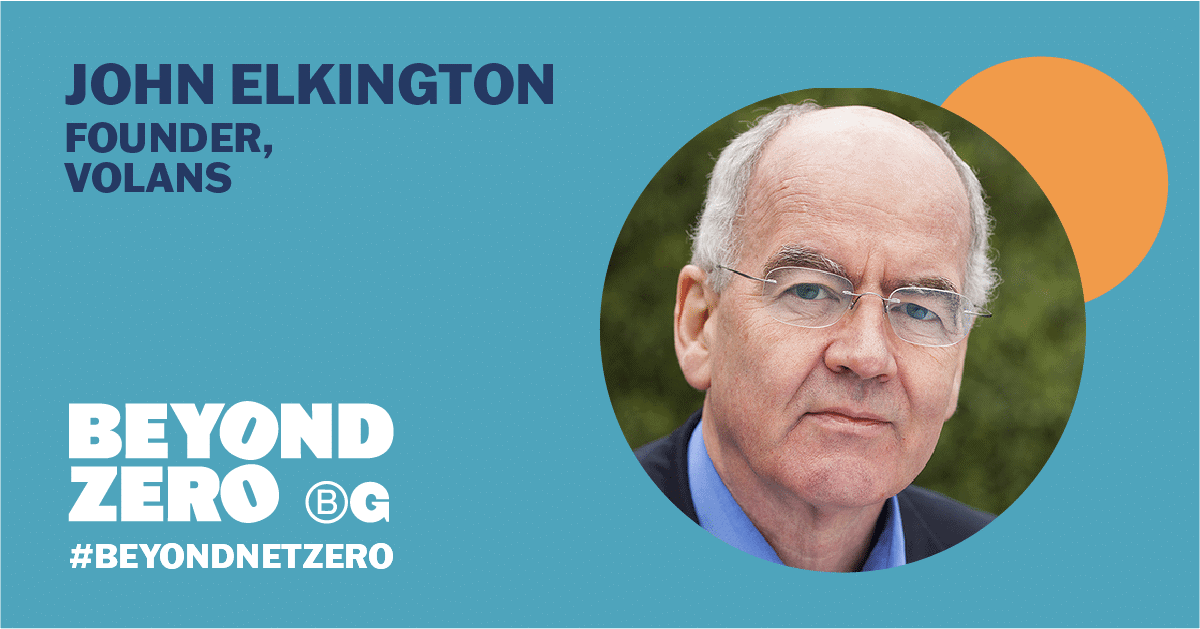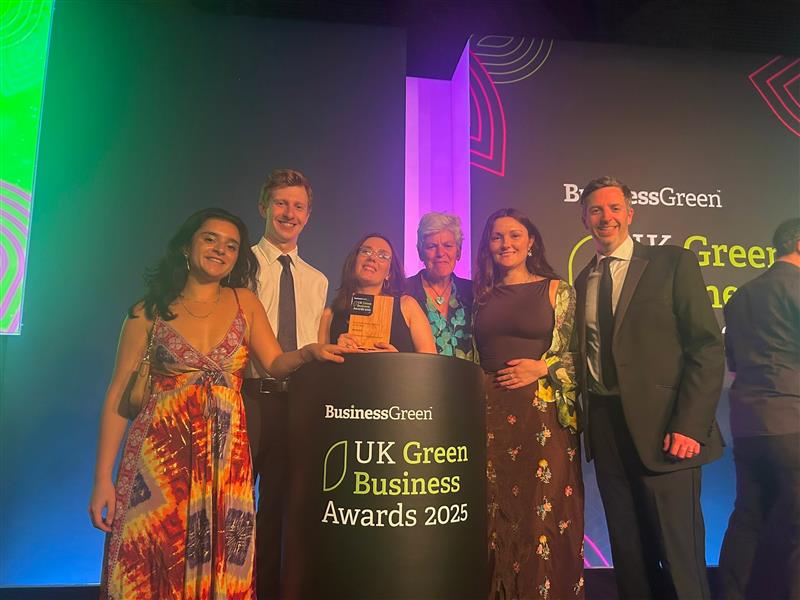Beyond Net Zero Hero: John Elkington, Founder of Volans

To many in the business world, John Elkington needs no introduction. A globally renowned expert on corporate responsibility and sustainable development, the writer and co-author of twenty books, and the brains behind the ‘triple bottom line’ concept of people, planet and profit, John is one of the most respected and eminent voices in his field. So what is his take on the role of businesses in working towards a green recovery?
On the subject of net zero, John is frank about what’s needed.
“This is not simply another language game that companies are being asked to play by slapping new labels and brandings on their products and activities. This is something that is existential… that is about the future of not just our economies and societies, but our civilisation.” For that reason, he insists that companies should focus on science-based targets in order to understand where there may be potential roadblocks to reaching net zero.
“I think it makes sense for CEOs and other business leaders to understand the science, understand the scale of their emissions, and understand the extent to which technology can improve their performance. But also understand where it is that, under current trajectories, they won’t get to net zero – and therefore, what governments and financial markets and so on will need to do. And therefore, what [businesses] need to do to lobby and agitate for the necessary market changes.”
When he talks about the potential for building back after the pandemic, John describes a world that “sparkles” with growth opportunities, pointing out that for us to truly build back better, we need to become regenerative, rather than just aiming for net zero.
“I actually think net zero signals a lack of ambition at some level, because it’s just doing less harm than we might otherwise do. No question, that can be a good thing. But I think that the sort of future that people are beginning to work towards envisioning, imagining, and so on, is a regenerative future.” It’s not just about restoring nature, he adds, but rebuilding our economies and communities.
“In the wake of the COVID-19 economic shock and social shock, we’ve got to build back better, build back greener and all of the good stuff that the EU Green Deal and US Green New Deal call for.”
When John talks about the next decade, it’s impossible not to feel daunted and inspired in equal measure. He speaks bluntly of the challenges tied to the situation in which we find ourselves – but also the possibilities.
“The next 10 to 15 years are going to be extraordinary. I think they’re going to be outside any sort of decadal experience that I’ve had… But I think our capacity and potential now to change the world for the better and really change systems – achieving change at the systemic level – is probably as great as it has ever been… and probably as great as it will be.”
Listen to the full interview with John Elkington, founder of Volans, below.
Jenny Briggs, Greenhouse PR (00:08)
Welcome to the Beyond Net Zero audio series.
We are at a critical moment. According to the IPCC, if we are to limit global warming to 1.5 degrees Celsius, it’s essential that we cut net global carbon emissions by 45% in the next decade, reaching net zero by 2050. But what if businesses could go one step further, reaching net zero and beyond by 2030? We’ll be interviewing game-changing organisations throughout B Corp month to find out how we can create and communicate a net zero future. The B Corp accreditation has huge potential to inspire more businesses to drive positive and meaningful action on climate change. So please tune in and listen to a series of business pioneers leading the way.
Hello, today I’m joined by Net Zero Hero guest and one of the founders of the global sustainability movement, John Elkington. John is a world authority on corporate responsibility and sustainable capitalism, a best selling author and a serial entrepreneur. Currently, he is the founding partner and chief pollinator – which is brilliant – at Volans. Welcome, John.
John Elkington, Volans (01:30)
Hello, Jenny. No one ever has previously called me a Net Zero Hero, whatever that means. So I’ll try and raise my standards slightly and see if I can stretch far enough, but great to be involved in the conversation.
JB (01:43)
Great to have you on. Now this audio series is all about showcasing the B Corps who are going above and beyond to exceed their B Corp accreditation and net zero targets. Because ultimately, we need businesses to adopt regenerative practices in order to create a fairer, greener future for everyone. John is a particularly noteworthy guest today as his book Cannibals with Forks back in 1997, popularised the Triple Bottom Line concept of people, planet and profit, and lay the foundations for sustainable business strategy. So I wanted to kick off by asking how optimistic you feel about the progress that has been made over the last decade in sustainable capitalism?
JE (02:26)
Well, the last decade is rather specific. I think for a long time, we’ve lived in a world which has been sort of semi exponential, and the thing with exponential trends is they take quite a long time to appear in a way that we can acknowledge and recognise. So in very recent times, you referenced the triple bottom line, and so on, and I think that took a huge time to really mainstream and it’s now mainstreaming in a slightly mutated way as ESG: environment, social and governance, forms of investment and analysis and so on. And I think that’s, on the one hand, encouraging, because it’s taking this rather anti Milton Friedman agenda into the mainstream, but the problem is, every time you have one of these herd movement moments where everyone wants to get on the bandwagon, at the same time, you get massive dilution of the sense of whatever the concept they’re raising might be. And I’ve gone through periods, like the green period, in the 80s, and early 90s. And suddenly, everything was green, when it really wasn’t, or is now sustainable, when it really wasn’t.
And already, the same trajectory is being demonstrated in relation to regenerative. Everything suddenly is beginning to be regenerative. That doesn’t mean that labels aren’t important. I think they’re crucial. But I think we’ve actually got to fight to maintain the sense that people should be understanding when they’re using this term. So I’m optimistic that we’re at an extraordinary, almost unique period, where things are taking off in a way that a few years ago, you wouldn’t have expected. And just finally, I think, for those with the longest memory, this is the first time ever, that when we’re coming out of one of those great societal pressure waves, that things are going into fast forward, rather than going into reverse which they almost always have done when we’ve had a recession or a war or whatever it was, in the past. So optimistic.
JB (04:38)
Oh, that’s good to know. What role do you think the B Corp movement has in the UK achieving and exceeding its net zero targets?
JE (04:48)
Well, firstly, net zero, I think is immensely important. It’s a concept and it’s a goal, and it’s a commitment that mainstream businesses are increasingly embracing and the government’s are sort of pushing towards as well. I think within that context, the B Corp movement has an immensely important role to play by demonstrating what is possible, but the problem with the B Corp movement is that it’s largely smaller, and if we’re lucky, medium sized companies – very few very big ones in there. So bigger companies may find it difficult to follow those sorts of models. And yet, one of the things that we’ve seen in recent years, there’s been a very rapidly growing fascination with an interest in B Corps. And among bigger companies, some of them are buying up B Corporations, Unilever would be one example. Not simply because they’re B Corps, but because they are good businesses. And with a healthy future, one hopes.
But I think B Corps, as I say, have a really important role to play. But I think they’re going to have to amplify what they’re saying and pushing towards by linking up with other partners in the landscape. Some of those could be rather unlikely partners, like I don’t know, the Confederation of British Industry, since you talk about the UK landscape, I think that would be immensely helpful. And I think this year is a remarkable one with G7, G20, COP26, the opportunities for that equal voice and a B Corp agenda, to be out there and heard, and push forward not just ‘Let’s commit to net zero by 2050, because we’ll all be retired or dead by then and who cares’. But thank you for committing by 2050, or 2040, or whatever it is. And now here’s how we’re going to do it. And we’re going to start immediately. But I think the sort of ‘can do’ spirit of the B Corp world will be hugely helpful in that respect.
JB (07:00)
I really like that. I think it’s all about making these commitments, but then striving to do better beyond them. Which is really what comes across through the B Corp movement. I really hope as well that these events like G7, like COP, end up happening, obviously, we’re on tenterhooks to see what world events get in the way. But hopefully, this will be the year of climate action that unfortunately didn’t happen last year.
JE (07:26)
Well actually, fortunately, I think, because I think the UK Government as one of the host countries was singularly ill-prepared for what it would have had to have done, so if it’d happened last year, it would have gone in the bin anyway. So this time, I think we’ve got a much, much better shot.
JB (07:42)
Yes, here’s hoping. And how do you think companies should approach their net zero targets?
JE (07:49)
I think, if they’re thinking about net zero, and they absolutely should be, they should be thinking about science based targets, firstly, because you know, this is not simply another language game, that companies are being asked to play by slapping new labels, brandings, on their products, and activities, and so on. This is something that is existential, this is something that is about the future of not just our economies and societies, but our civilisation. And therefore, I think it makes sense for CEOs and other business leaders to think this through very seriously and understand the science, understand the scale of their emissions, and understand the extent to which technology can improve their performance, but also understand where it is that under current trajectories, they won’t get to net zero, and therefore, what governments and financial markets and so on will need to do, and therefore, what they need to do to lobby and agitate almost, for the necessary market changes.
JB (09:01)
It’s really interesting that you bring up language, because I’m quite interested to hear from you on what you think the public perception is of net zero. Do you think people understand what it means? Or is it a buzzword that is going right over people’s heads?
JE (09:17)
Who knows, and I haven’t seen proper consumer or citizen surveys, but my sense is, people are increasingly agitated about climate change, and particularly if it’s framed as global heating or, you know, climate emergency or whatever. But I think a lot of this rather more technical branding and language around net zero and so on just passes them by. I mean, even zero would pass them by to some degree. I think they will understand that carbon or the greenhouse gases need to come under pressure, they need to be squeezed out of our lifestyles and economies and so on. But I wouldn’t, if I were doing any sort of consumer campaign, I don’t think I’d use net zero at this part of the development of this sort of discussion, I just don’t think it means enough to people yet. Doesn’t mean it couldn’t in future, but it needs a very big marketing and advertising budget, I suspect, for that to happen.
JB (10:21)
Yes, agreed. Then, from your perspective, what does a net zero future look like to you? What do you see in 2030 or 2050, hopefully, if we go down the right path?
JE (10:34)
Well I actually think net zero signals a lack of ambition at some level, because it’s just doing less harm than we might otherwise do. No question, that can be a good thing. But I think that the sort of future that people are beginning to work towards envisioning, imagining, and so on, is a regenerative future. And by that I don’t simply mean regenerating the natural environment, though God knows we’ve got to do that. But in the wake of the COVID-19 economic shock and social shock, we’ve got to rebuild our economies and build back better, build back greener and all of that sort of good stuff.
But I don’t think we can do that without actually regenerating. And by that, I don’t mean simply building back as we had it before business as usual, or whatever. I mean, regenerating our economies by starting to turn them towards the goal, not just simply degenerating everything that they touch, except social and to some degree, economic returns, but actually genuinely building back better on every level and everything that they would touch starts to, I’m going to sound a bit Hollywood-ish, or Disney like, but it would sparkle. People would recognise that the air was getting cleaner, their health was improving the quality of the jobs that they were doing. were improving trust, faith, and democracy. All these different things are suffering at the moment. They’re all showing signs of strain, almost disease in a way.
And our generational challenge is to address all of those things simultaneously in a joined up way, and make sure that whoever takes over from current generations will actually say, thank God, they existed. They did us proud. We’re so far from that at the moment. I think this is a very, very big step up for all of us. But I increasingly feel people don’t know this, they suspect it but they want leadership that shows the way. And they want to be part of something much bigger than themselves.
JB (12:43)
I think that sounds really optimistic. And hopefully, we are in a tipping point as well, just because our whole economy and everything has had to freeze due to this pandemic, hopefully, this will mean that the rhetoric that’s coming out around Build Back Better is actually going to spark action and solid movements in the right direction.
JE (13:03)
And I think, the scale of what’s starting to happen, for example, the EU Green Deal, $1.82 trillion. And what’s just happened in the United States where President Biden’s signed off on a $1.9 trillion rescue package is very encouraging. As long as you say the rhetoric becomes reality, because people are making lots of pledges to be inclusive, and green and clean, and all the rest of it. But, but we’ve really got to make that the experienced reality of ordinary people. Otherwise, the political blowback could be quite considerable.
JB (13:40)
Indeed. Looking to the future, I’d love to know what ambitions you have for the next 10 years. And I loved reading, I think it was on the Volans website, that you still don’t know what you want to do when you grow up. And I’m so interested to hear what you think that could involve in the future?
JE (13:58)
Well, sadly, it’s true. But, you know, I think there is a child in me, which is endlessly curious, and just fascinated to see what happens next, but I think the next 10 to 15 years are going to be extraordinary. I think they’re going to be outside any sort of decadal experience that I’ve had, and certainly many younger people too. But I think our capacity and potential now to change the world for the better and really change systems. Change at the systemic level is as great as it probably has ever been, except after wars, and probably as great as it will be, given that if we don’t get this right, reality is really uncomfortable, reality is going to press in on us and just interrupt our ability to do what we really do need to do.
So I’m immensely excited, immensely committed, and delighted that the B Lab ecosystem, B Corps and the rest of it is out there. It’s just wonderful to feel that sense of – it used to be a bad thing to say fellow travellers – but fellow travellers. People are in this world to broadly push in the same direction and it’s a privilege and to all of those B Corps out there and all those people who want to become B Corps or haven’t perhaps even thought about it yet, thank you for doing what you are doing and what you will do in future. It’s going to count, it’s important.
JB (29:09)
You have been listening to Beyond Net Zero, a campaign celebrating pioneering B Corporations, from Greenhouse PR. Find out more on our website and sign up to our webinar on March 31, with John Elkington, a world authority on corporate responsibility and sustainable development.
Discover more interviews from our Beyond Net Zero Heroes:


